The views expressed in this article are of the author only and do not necessarily represent those of the Center for Pastor Theologians.
How the Nations Rage: Rethinking Faith and Politics in a Divided Age
Jonathan Leeman
Thomas Nelson (2020). 272 pp.
Jonathan Leeman is editorial director of 9Marks and also serves as an elder at Cheverly Baptist Church in suburban Washington, D.C. This book is a popular-level reworking of his Political Church: The Local Assembly as Embassy of Christ’s Rule (IVP Academic, 2016).
Psalm 2 famously describes the nations as “raging” against the Lord, but some Americans may be shocked to hear Leeman so quickly toss the United States into this group (p. 18). But anytime we are denied what our hearts want, “we rage” (p. 56). The task of the church, according to Leeman, is to resist division amongst ourselves, recognize that we are heaven’s ambassadors, and reestablish our churches as its embassies.
The second chapter is probably Leeman’s most seminal. He argues that the public square is not a neutral place that rises above religious convictions—it is actually a “battleground of the gods” (p. 23). The American Experiment was the notion that people of many religions could establish a government based on certain shared universal principles. Yet insofar as every person worships, they have a “god” lurking behind their worldview. With that “god” comes a brand of justice and a corresponding concept of equality, freedom, and rights. “Pick your God or gods; out will come your views on justice. Pick your conception of justice; out will come your views on equality, freedom, and rights” (p. 206). Because governments end up serving these various gods, it’s foolish to think anyone can separate their politics from their religion. This actually rigs the current political system against Christians insofar as it keeps organized religion out, while allowing unnamed idols in (like a Trojan horse). In the end, some elements of Christian speech—related to family, sexuality, and religion specifically—are invariably made to sound irrational and therefore unjust. Since the secularist isn’t constrained by having a “church,” they can impose their beliefs and morals upon the rest of us.
As Leeman delves into hermeneutics, he builds on the work of Peter J. Gentry and Stephen J. Wellum, Kingdom Through Covenant. Readers of Scripture are urged to consider “which covenant audience” a biblical passage has in mind and resist treating the Bible like case law. It is more like a constitution, in that it provides “the rules for making the rules” (p. 79). Aside from some constitutional basics (e.g., do not murder, do not steal, etc.), most political questions of the day are unscripted and occur in what Leeman considers to be wisdom’s territory. Perhaps one of the most helpful contributions in the book is Leeman’s distinction between “straight-line” and “jagged-line” issues. Sometimes there is a straight line from a core biblical principle to a particular political application. But many other times things are more complex and jagged (p. 93). Far too much political dialogue among Christians today thoughtlessly and divisively treats everything as a straight-line issue. Churches and pastors must resist binding consciences on jagged-line issues. Leeman warns that “[w]hen pastors or churches tie their names to a piece of governmental policy, legislation, or nomination, they effectively tie the name of Jesus to that endeavor” (p. 147). This chapter may prove particularly helpful for pastors trying to navigate the relationship between biblical principles and political issues.
The latter half of the book is much more practical. Leeman suggests that purpose of government is like “guardrails on a mountain highway” (p. 101). It is to provide a platform for justice, peace, and flourishing, even while building a stage for redemption. Churches need good governments, but he warns against putting too much hope in government. Readers are urged to remember that politics in this world will always be what Leeman calls “Sisyphean.” In Greek mythology, Sisyphus was a king who was condemned to roll an immense boulder up a hill, watch it roll down again, and repeat this act for eternity. “So it is with our political accomplishments in this world” (p. 171). We should still speak and work faithfully, but also “expect the lions” (p. 173).
Disengagement is never a good option in a democratic society—but Leeman warns that we must be equally wary of capitulation. It’s possible to engage rightly on the substance of an issue but be wrong on our strategy and tone. Leeman wraps the knuckles of the Christian Right when he warns against allowing our language to take on an apocalyptic tone. This gives earthly political outcomes “an outsized importance” (p. 164). Leeman also chastises the church for allowing political parties to set an agenda that we unquestioningly follow. Parties are good servants but terrible masters—“useful instruments, but awful identities” (p. 131). “One sign that you identify more with your ideological tribe than you do with Jesus is that you cannot hear what’s good when it comes from another tribe” (p. 182). He urges every Christian to know their political party’s strengths, weaknesses, and idolatrous trajectories. Such awareness will help us hold all our party affiliations with a loose grip and keep them from domesticating our faith.
Leeman’s work is laced with many practical examples drawn from his local church experiences in the D.C. area. Race relations and systemic structures of racial injustice receive a significant amount of attention, and Leeman may get sidetracked with a lengthy discourse on church membership here and there (his 9Marks colors shining through?). Some might nitpick that he veers too frequently into issues of sexuality. But he is essentially following the work of Mary Eberstadt, who has argued that the sexual revolution is the new orthodoxy that has replaced the Judeo-Christian ethic. Apart from a bit of repetitiveness and some odd organization (three lessons followed by twelve more lessons in the same chapter?), the work is otherwise solid, relatable, and highly readable. Leeman has challenged the church to become “heavenly outposts” where a robust vision of justice starts and then spills outward (p. 231). Toward this end I believe he has provided pastors, students, and educated laypersons with a deeply thoughtful and helpful resource.
Jason A. Nicholls (PhD, University of Marquette) is the Lead Pastor at Redeemer Missionary Church in South Bend, Indiana. He is a member of the St. John Fellowship of the Center for Pastor Theologians.




